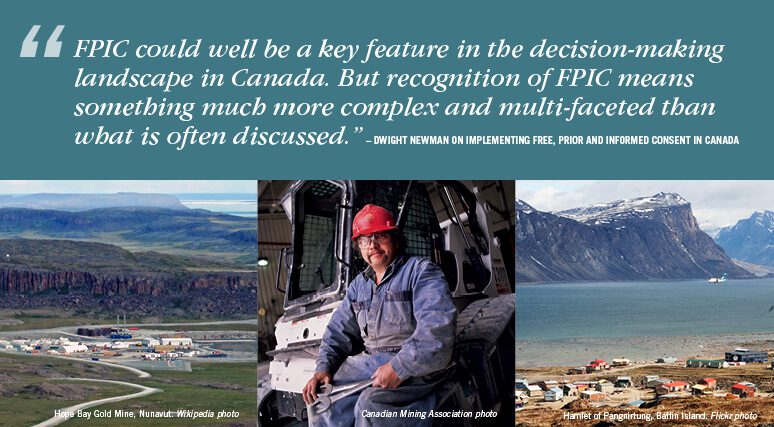
Implementing free, prior and informed consent in Canada will be much more complex than many advocates would have you believe
OTTAWA, Aug. 15, 2017 – The idea of a requirement for free, prior and informed consent by Indigenous communities for resource projects (FPIC), has been a heated subject of debate since Canadian Prime Minister Justin Trudeau promised during the 2015 federal election to implement the UN Declaration on the Rights of Indigenous Peoples, which FPIC is a part of, in its entirety. And last month, the government released 10 principles to guide its relations with Indigenous peoples which suggested the government has a more limited view of FPIC than its previous pronouncements would suggest.
Now, MLI Munk Senior Fellow Dwight Newman, one of Canada’s leading experts on Indigenous rights, cuts through the confusion on FPIC and examines what implementing it will really mean for Canadian law, in a new paper for the Macdonald-Laurier Institute.
To read the full paper, click here.
 In the paper, titled “Political Rhetoric Meets Legal Reality,” Newman debunks some common misperceptions about FPIC that have dominated the debate, and puts it in the context of Canada’s current regime which imposes a “duty to consult and accommodate” Indigenous communities.
In the paper, titled “Political Rhetoric Meets Legal Reality,” Newman debunks some common misperceptions about FPIC that have dominated the debate, and puts it in the context of Canada’s current regime which imposes a “duty to consult and accommodate” Indigenous communities.
A greater awareness by policy makers of some of the realities of Canadian constitutional law and of international law can lead to better informed policy as we all seek a path forward to reconciliation and prosperity for Indigenous peoples.
“FPIC could well be a key feature in the decision-making landscape in Canada,” writes Newman. “But recognition of FPIC means something much more complex and multifaceted than what is often discussed.”
Newman challenges a number of key assertions about FPIC. It has been claimed that FPIC is international law, that it represents a veto on development if there is opposition from Indigenous communities, and that it should replace Canada’s existing regime of a “duty to consult and accommodate”. There are serious problems with all of these claims. While the UN Declaration on the Rights of Indigenous Peoples is an important document and can form the basis for improved treatment of Indigenous rights in Canada, it is not a treaty and is not binding. Nor, upon careful reading, does it always require the consent of affected communities, only a good faith effort with an “aim” to obtain consent. Finally, Newman worries that the wide protection of the existing standard of “duty to consult”, which in some cases does in fact already require consent by the community, may be lost if the courts impose a consent requirement on consultations.
Finally, the federal government couldn’t “implement” FPIC even if it wanted to. Much of the constitutional jurisdiction exists at the provincial and territorial levels. As Newman points out, “because of the widespread public confusion and lack of interest in details of constitutional jurisdiction, provincial and territorial officials are often let off the hook”.
Despite all this, Newman says Canada can indeed move toward implementing FPIC, but in a way that is more sensitive to the legal realities outlined in the paper. “Canada is not alone in facing challenges in relation to FPIC although it is taking the issues related to it more seriously than many other states,” writes Newman.
To better achieve a “made-in-Canada” approach to FPIC, Newman proposes the following recommendations:
1) Courts should resist efforts to insert consent requirements extensively into the law where they would actually pose longer-term risks to Canada’s existing duty to consult framework.
2) Parties should be working constructively together to pursue statutory reforms that remove barriers to Indigenous communities’ success.
3) Governments need to clearly enunciate the position that FPIC implies good processes but not total control of decisions by Indigenous communities, and should avoid political rhetoric that contributes to ongoing confusion and inaccurately heightens expectations.
4) Indigenous communities should continue to make their own governance structures clear and transparent and consider publishing documents concerning those governance structures to facilitate engagement with governments and industry stakeholders.
5) Provinces and territories should consider implementing legislation, following full discussion with Indigenous communities and stakeholders, on impact and benefit agreements (IBAs) that would set a legal standard for consent for such agreements to be valid.
6) The federal government should consider convening a conference on FPIC implementation that would gather together provincial, territorial, and Indigenous leaders, which would highlight the importance of federal leadership while recognizing the need for decentralized FPIC implementation.
***
Dwight Newman is a Munk Senior Fellow of the Macdonald-Laurier Institute and Canada Research Chair in Indigenous Rights at the University of Saskatchewan College of Law.
The Macdonald-Laurier Institute is the only non-partisan, independent national public policy think tank in Ottawa focusing on the full range of issues that fall under the jurisdiction of the federal government.
For more information, please contact Mark Brownlee, communications manager, at 613-482-8327 x105 or email at mark.brownlee@macdonaldlaurier.ca.




